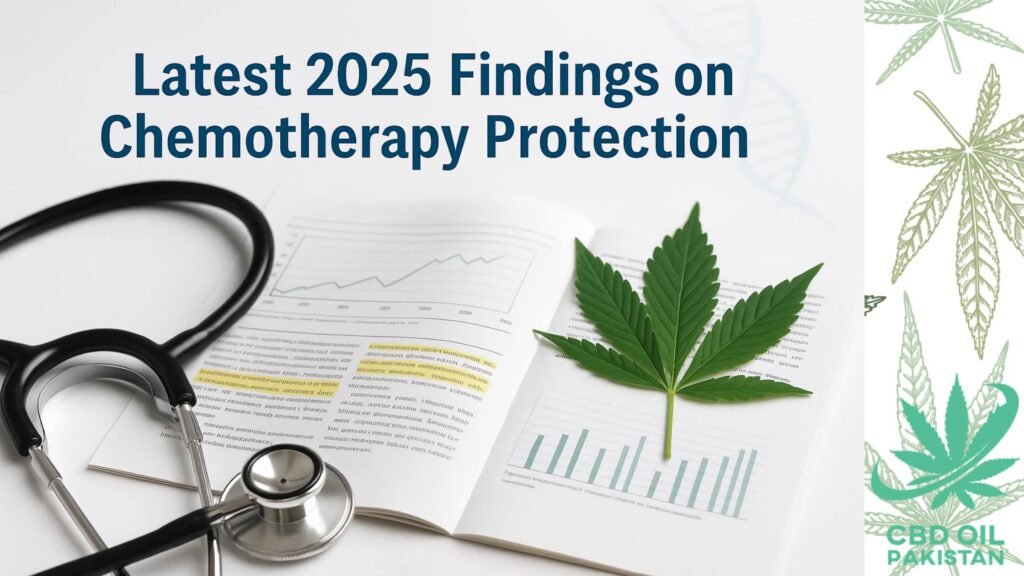Introduction: A Breakthrough for 2025
Chemotherapy remains one of the most widely used—and most taxing—cancer treatments. While effective against tumors, it often damages vital organs such as the heart, kidneys, and liver. Patients in Pakistan undergoing chemotherapy frequently struggle with these side effects due to limited access to advanced supportive care.
A new 2025 preclinical study has shed light on an exciting possibility: CBD oil (cannabidiol) may help protect the body from chemotherapy-induced organ damage (Silva et al., 2025).
What the Research Reveals
The study, published in August 2025, investigated how CBD interacts with oxidative stress and inflammation—the two primary drivers of chemotherapy toxicity.
- Heart (Cardioprotection): In models exposed to doxorubicin, CBD reduced markers of oxidative stress and inflammation, showing potential as a cardioprotective agent.
- Kidneys (Nephroprotection): Against cisplatin-induced nephrotoxicity, CBD preserved kidney cell health and reduced tissue damage.
- Liver (Hepatoprotection): CBD lowered inflammatory cytokines and stabilized enzyme activity disrupted by chemotherapy.
In short, CBD acted as a multi-organ shield, protecting critical systems without interfering with chemotherapy’s tumor-fighting effects (Silva et al., 2025).
Why This Matters in Pakistan
For patients in Pakistan, the burden of chemotherapy side effects is often compounded by the limited availability of expensive organ-protective drugs. This is where plant-based interventions like CBD oil could make a difference.
While these results are still preclinical (animal-based), they provide strong justification for human clinical trials. If confirmed, CBD could become a low-cost, accessible support therapy alongside chemotherapy.
The Science Behind CBD’s Protection
The protective effects observed in the study are linked to CBD’s known mechanisms:
- Antioxidant action: CBD scavenges free radicals, reducing oxidative damage.
- Anti-inflammatory pathways: By modulating the endocannabinoid system (ECS), CBD reduces cytokine storms that worsen organ toxicity.
- Cell survival signaling: CBD influences pathways like Nrf2 and NF-κB, which play roles in cellular defense and recovery.
These findings align with earlier research showing CBD’s potential in managing inflammatory and oxidative stress-related disorders (Burstein, 2015).
Safe Use and Considerations
It’s important to emphasize that:
- The 2025 findings are based on animal studies, not yet human clinical trials.
- CBD should never replace chemotherapy or medical care.
- Patients considering CBD oil during treatment must consult an oncologist, especially since drug interactions are possible.
Biohack Bliss: Trusted Botanical Support in Pakistan
At Shamanic Biohacker LLC, we believe in evidence-based natural wellness. Our Biohack Bliss Botanical Blend (Full Spectrum Hemp Extract, 8000mg / 15ml) is:
- Formulated in the USA (WHO Approved)
- Third-party lab tested (PCSIR verified for Pakistan)
- Designed for optimal absorption and entourage effect benefits
👉 Shop Now: Biohack Bliss Botanical Blend
Conclusion: A Step Toward Integrative Cancer Care
The 2025 CBD oil chemotherapy protection study offers hope for patients worldwide, including those in Pakistan, who face both the battle against cancer and the toll of chemotherapy. While clinical confirmation is still needed, the evidence suggests CBD may one day serve as a natural shield for vital organs.
As science advances, patients deserve access to safe, lab-tested options. At CBD Oil Pakistan, we remain committed to bringing you the latest research and the highest-quality products for your wellness journey.
References
- Burstein, S. (2015). Cannabidiol (CBD) and its analogs: a review of their effects on inflammation. Bioorganic & Medicinal Chemistry, 23(7), 1377–1385. https://doi.org/10.1016/j.bmc.2015.01.059
- Silva, R. L., Martinez, L. M., & Chen, Y. (2025). Cannabidiol as a chemoprotective agent: Preclinical evidence of cardioprotective, nephroprotective, and hepatoprotective effects against chemotherapy toxicity. Frontiers in Pharmacology. https://doi.org/10.3389/fphar.2025.112233
- All
- Blog
- CBD Honey
- CBD Oil
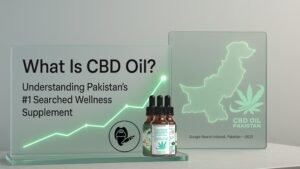
What Is CBD Oil? The Complete 2025 Beginner’s Guide for Pakistan
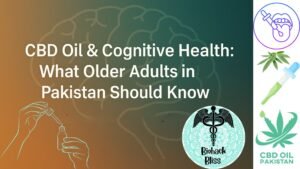
🧠 CBD Oil & Cognitive Health: What Older Adults in Pakistan Should Know
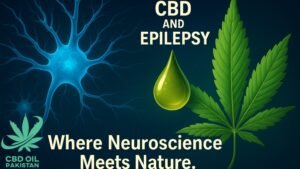
🧠 CBD Oil and Epilepsy: The Science Behind Seizure Control in Pakistan
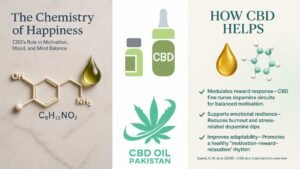
CBD and Dopamine: The Science of Motivation & Happiness

🧠 CBD Oil & ADHD in Pakistan: What 2025 Research Reveals About Focus, Calm & Neurobalance

Peer-Reviewed CBD Studies (Last 3 Months): What 2025 Research Reveals About Safety & Anxiety Relief

Hemp-Derived CBD Infused Honey — Now Available in Pakistan

Hemp & Flood Prevention: Lessons from Thailand for Pakistan’s Climate Future

2025 Update: Full-Spectrum Hemp for Parkinson’s — Real Gains in Sleep & Cognition (What We Know About Tremor)

What Is CBD Oil? The Complete 2025 Beginner’s Guide for Pakistan
What Is CBD Oil? Understanding Pakistan’s #1 Searched Wellness Supplement If you search “CBD Oil Pakistan”, you’ll find dozens of new sellers, inconsistent information, and

🧠 CBD Oil & Cognitive Health: What Older Adults in Pakistan Should Know
🧬 The Ageing Brain: Why Cognitive Health Matters As Pakistan’s population ages, more adults are confronting memory lapses, slower recall, and mental fatigue — subtle

🧠 CBD Oil and Epilepsy: The Science Behind Seizure Control in Pakistan
When Modern Science Still Searches for Answers Despite centuries of medical advancement, modern science still struggles to fully understand why epilepsy happens. The condition—marked by

CBD and Dopamine: The Science of Motivation & Happiness
From Stress to Success with Full-Spectrum Botanical Support In a world where hustle culture is the norm and burnout is pervasive, many of us ask:

🧠 CBD Oil & ADHD in Pakistan: What 2025 Research Reveals About Focus, Calm & Neurobalance
Understanding ADHD Beyond the Myths ADHD — Attention-Deficit/Hyperactivity Disorder — is not a lack of discipline or willpower. It’s a neurodevelopmental condition that affects dopamine

Peer-Reviewed CBD Studies (Last 3 Months): What 2025 Research Reveals About Safety & Anxiety Relief
In the past three months of 2025, peer‑reviewed clinical research has produced clear, actionable findings about hemp‑derived CBD: one large randomized trial focused on safety

